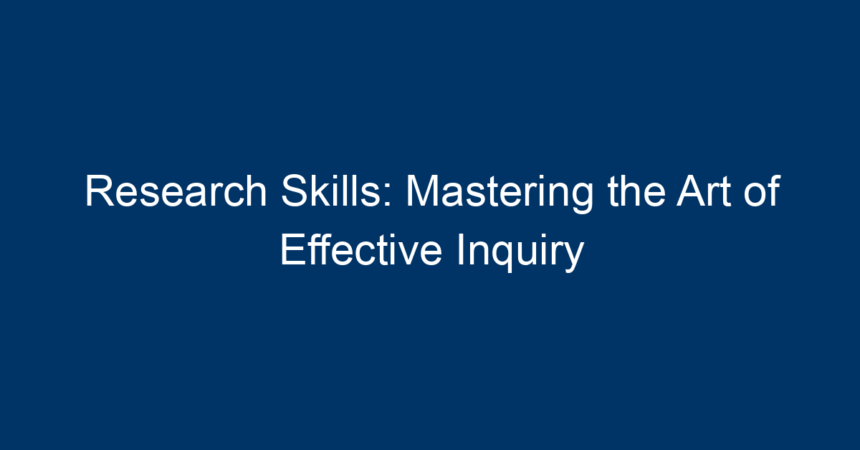In today’s information-driven world, the ability to conduct thorough research is invaluable. Whether you’re a student, a professional, or simply someone looking to satisfy your curiosity, mastering research skills can elevate your inquiry process, lead to better conclusions, and enhance your decision-making. With the digital landscape overflowing with data, deciphering what is credible and relevant is more crucial than ever. This article explores the essential components of effective research skills, empowering you to navigate the complexities of inquiry with confidence and precision.
The Importance of Research Skills
Research skills are much more than just finding information. They encompass critical thinking, analytical abilities, and effective communication. Here’s why enhancing your research skills matters:
-
Informed Decision-Making: Strong research skills enable you to sift through vast amounts of information to make informed choices, whether in academic settings, workplaces, or life in general.
-
Critical Thinking: Research fosters analytical thinking by encouraging you to evaluate sources, understand different perspectives, and synthesize information.
-
Problem-Solving: The ability to conduct effective research helps you identify and solve problems, making you a valuable asset in any team or project.
- Communication: Good research skills culminate in effective communication, equipping you to present your findings persuasively to others.
The Research Process: Breaking It Down
Mastering research skills involves understanding the research process, which can be broken down into several critical phases:
1. Defining Your Research Question
A well-defined research question is the cornerstone of effective inquiry. Start with a broad topic of interest and narrow it down using specific criteria. Consider using the "5 Ws":
- Who: Who is the target audience?
- What: What is the main objective of your research?
- When: What time frame are you investigating?
- Where: What is the geographical scope?
- Why: Why is this research question significant?
2. Conducting Background Research
Before diving deep, conduct preliminary research to familiarize yourself with existing literature. Utilize various sources such as:
- Books: Academic and non-fiction books provide an established foundation on a topic.
- Scholarly Articles: Peer-reviewed journals present research from experts in the field.
- Web Resources: Online databases, educational websites, and reputable blogs can offer valuable insights.
3. Developing a Research Plan
Creating a structured plan can streamline your research process. Outline the following points:
- Methodology: Decide on qualitative or quantitative methods, surveys, interviews, or case studies as per your research question.
- Timeline: Set specific deadlines to maintain a productive workflow.
4. Gathering Information
Once your plan is in place, start the data collection process. Utilize various research methods and tools, such as:
- Online Databases: Use sources like JSTOR, Google Scholar, or your institution’s library database for access to academic literature.
- Surveys and Interviews: Designing questionnaires or conducting interviews can provide first-hand, qualitative data.
- Field Research: Observations and ethnographic studies can offer unique insights, especially in social sciences.
5. Evaluating Sources
In an age where misinformation is rampant, evaluating sources is vital. Consider the following criteria:
- Credibility: Is the author an expert in the field?
- Relevance: Does the information address your research question?
- Bias: Is there an apparent bias that could affect the credibility of the information?
- Recency: Is the information up-to-date and relevant to your topic?
6. Analyzing Data
Once you’ve collected your data, the next step is analysis. This involves:
- Organizing Information: Use charts, graphs, and tables to categorize data effectively.
- Interpreting Findings: Assess the significance of your findings in relation to your research question. Look for patterns, anomalies, and insights.
7. Presenting Your Research
The final step is to communicate your findings clearly and concisely. Consider:
- Structure: Follow a logical format such as introduction, methodology, findings, discussion, and conclusion.
- Visual Aids: Incorporate visuals to enhance understanding and retention.
- Clarity: Use simple language and define any complex terms to ensure readability.
Tips for Enhancing Your Research Skills
Improving your research skills is a gradual process that benefits from practice. Here are actionable tips to help you on your journey:
Stay Curious
Curiosity is the driving force behind inquiry. Always ask questions, seek answers, and be willing to explore new topics.
Embrace Technology
Utilize research tools and apps designed to streamline your inquiry processes. Tools like Zotero for citation management, Evernote for note-taking, and Google Scholar for academic searches can enhance your efficiency.
Connect with Others
Joining research groups, attending workshops, or collaborating with peers can provide new perspectives and methodologies, enriching your research skills.
Continue Learning
Take advantage of online courses, webinars, and resources available through institutions to hone your abilities continuously.
Reflect on Your Work
After completing a research project, take time to reflect on what worked and what could be improved. This analysis helps you grow as a researcher and prepares you for future inquiries.
Conclusion
Mastering research skills is essential in today’s fast-paced, information-rich environment. By following a structured research process, refining your techniques, and continuously learning, you can elevate your effectiveness as a researcher. Whether your goal is academic achievement, professional success, or personal curiosity, strong research skills will empower you to navigate the complexities of inquiry with confidence.
Acting on these insights will lead to not only better research outcomes but also a stronger foundation for critical thinking, problem-solving, and effective communication. Start cultivating your research skills today, and unlock a world of knowledge and opportunities awaiting you!




